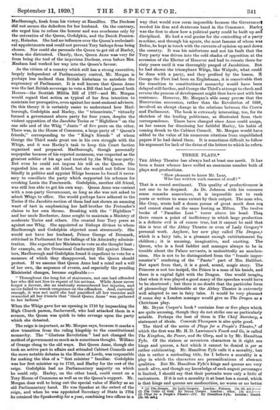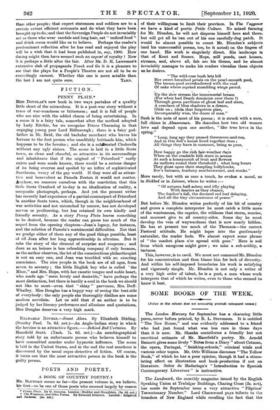THREE PLAYS.* THE Abbey Theatre has always had at least
one merit. It has been a fount whence have welled an enormous number both of plays and productions.
"How pleasant to know Mr. Lear,
Who has written such masses of stuff!"
That is a sound sentiment. This quality of productiveness is not one to be despised. As Dr. Johnson with his common sense remarks somewhere, it is impossible not to rank poets or writers to some extent by their output. The man who, like Gray, wrote half a dozen poems of great merit does not and cannot stand on the same footing as Milton. The twelve books of " Paradise Lost " tower above his head. That there comes a point of inefficiency in which large production is a definite evil is of course true, but it cannot be said that this is true of the Abbey Theatre or even of Lady Gregory's personal work. Anyhow, her new play called The Dragon,' which is a fairy tale, is a pleasant enough entertainment for children ; it is amusing, imaginative, and exciting. The Queen, who is a food faddist and manages always to be in trouble about the Palace servants, is undoubtedly an anachro- nism. She is not to be distinguished from the " female imper- sonator's" rendering of the "Panto" part of Mrs. Hallibut. But apart from that, it is a good, sound, magic story. The Princess is not too insipid, the Prince is a man of his hands, and there is a capital fight with the Dragon. One would imagino that when it was played a good many of the speeches would have to be shortened ; but there is no doubt that the particular form of phraseology fashionable at the Abbey Theatre is extremely well adapted to use in fairy tales. It would be very pleasant if some day a London manager would give us The Dragon as a Christmas play.
Mr. Bryan Cooper's book 2 contains four or five plays which are quite amusing, though they do not strike one as particularly actable. Perhaps the best of them is The Chief Secretary, a statement of ideals. Comrade Thompson is also quite good.
The third of the series of Plays for a People's Theatre,3 of which the first was Mr. H. D. Lawrence's Touch and Go, is called The Kingdom, the Power, and the Glory, and is by Mr. Hamilton Fyfe. Of the sixteen or seventeen characters in it eight are kings and queens, a fact which it cannot be denied is per as rather exhilarating. Mr. Hamilton Fyfe calls it a morality, but this is rather a misleading title, for I believe a morality is a play in which the characters are personifications of abstract qualities. But Mr. Hamilton Fyfe's kings and queens are very much alive, and though my knowledge of such august personages is limited, I should say that their portraits were only a little of caricatures. If it is not a morality it at least has a moral, which is that kings and queens are mediocrities, no worse or no better • (1) The Dragon. By Lady Gregory. London : Putnam. [3s. ed. nee.)--... (2) The Collar of Gold. By Bryan Cooper. London : Allan. [3s. nat.)--- (3) Plays for a People's Theatre—III. By Hamilton Fyfe. London ; Daniel. ed.. net.), than other people ; that expert statesmen and soldiers are to a certain extent efficient automata and do what they have been brought up to do ; and that the Sovereign People do not invariably act as those who wear sandals and long hair, eat " unfired food" and drink cocoa would like us to believe. Perhaps the reader's predominant reflection after he has read and enjoyed the play will be a wish that it had been published in, say, 1900. Row daring might then have seemed such an expose of royalty ! Now it is perhaps a little after the fair. After Mr. D. H. Lawrence's extensive slab of propaganda Touch and Go it is a pleasure to see that the plays for a People's Theatre are not all to be so exceedingly earnest. Whether this one is more actable than



































 Previous page
Previous page